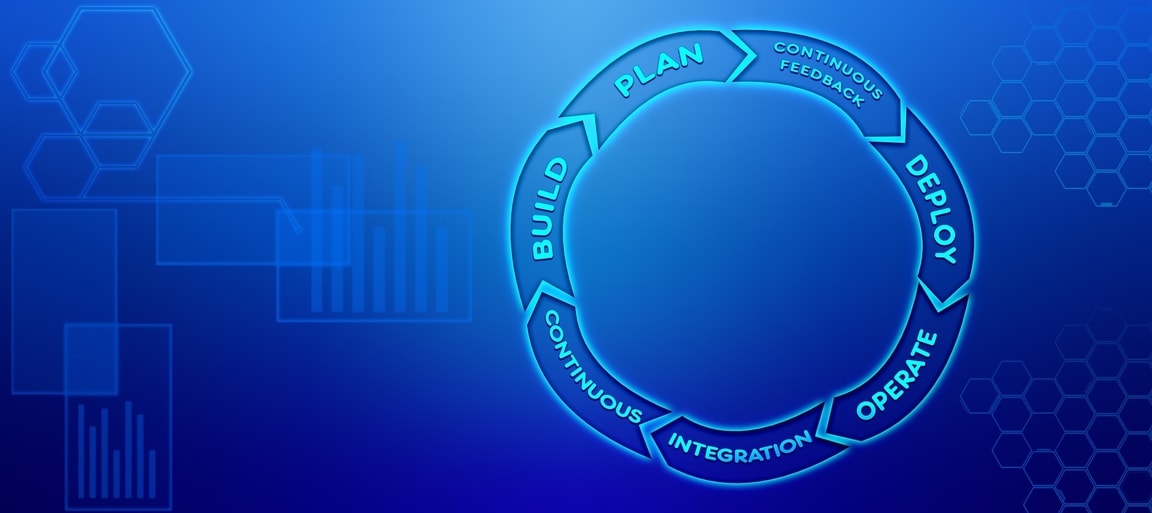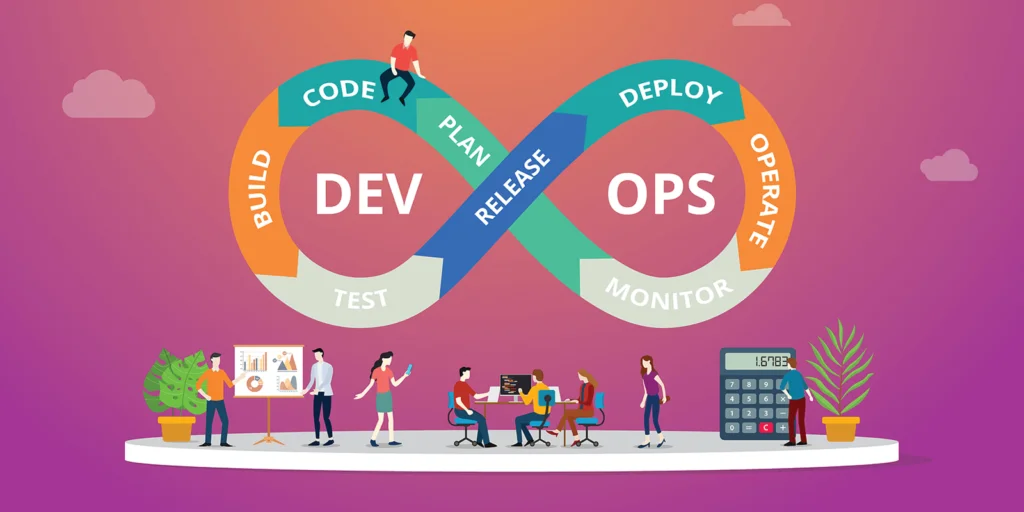Hello!
If you look at most companies across the globe, you are likely going to find at least one employee working as a DevOps engineer.
 This is a role whose importance has grown over the last few years especially due to advancements in technology and the changing requirements of organizations as well as their customers.
This is a role whose importance has grown over the last few years especially due to advancements in technology and the changing requirements of organizations as well as their customers.
This change has opened new opportunities and career paths for system engineers and administrators, giving them the chance to not only increase their earnings but also build their careers and grow their skills.
However, did you know that DevOps engineers need to have architectural knowledge for them to be successful in their careers? Before we get started, let us discuss what DevOps engineering, also referred to as a DevOps architecture is.
Introduction to DevOps Architecture
DevOps is a field that involves a lot of professionals. It starts with operators, developers, and quality assurance professionals. It also revolves around every other person in an organization especially when it comes to releasing new products to the market.
In DevOps architecture, the right professionals use the right tools such as API monitoring service tools to ensure that software services are thoroughly tested and monitored before they can be released to users. Using different principles applicable in DevOps, this is easily achieved.
What Constitutes a Successful DevOps Engineer?
 To be successful as a DevOps engineer, one of the most important things to understand is that DevOps is not simply a framework used when developing computer systems.
To be successful as a DevOps engineer, one of the most important things to understand is that DevOps is not simply a framework used when developing computer systems.
On the contrary, it is more of a philosophy, a culture, and a mindset that focuses on continuous improvement, communication, and collaboration to sustainably and rapidly build and release software applications efficiently.
DevOps’ main aim is to make sure that the entire organization is involved when building and delivering software applications and their improvements. This way, we can say that DevOps has taken inspiration and guidelines from Agile development.
What Makes DevOps Better?
DevOps offers more benefits compared to Waterfall and Agile development. This is because, in Waterfall and Agile development, developers are forced to build an entire project before they can hand it over to testers and other professionals in the pipeline.
 Operators and developers worked in silos before. While developers’ main aim was to write code, operators focused on testing and running the code to make sure that the applications do what they are supposed to do.
Operators and developers worked in silos before. While developers’ main aim was to write code, operators focused on testing and running the code to make sure that the applications do what they are supposed to do.
This mode of operation was quite challenging especially because of closed collaborations and communication breakdowns.
Things that are easy to handle such as passing customer requests to the right people became quite difficult. This is something that is still happening in organizations that have not implemented the use of the DevOps architecture.
What Makes Architectural Knowledge Important for DevOps Engineers?
For one to be a successful DevOps engineer, one needs to possess architectural knowledge. This will play an important role in helping them handle their tasks and guiding their organizations in the right direction.
 Several reasons make architectural knowledge important in the life of a DevOps engineer, key among them:
Several reasons make architectural knowledge important in the life of a DevOps engineer, key among them:
- It helps them to be visionary and thought leaders for their organizations. This is because DevOps should not be seen as a destination, but a journey. With the right architectural knowledge, a DevOps engineer can lead the transformational change of their organizations without any problems.
- Architectural knowledge does not only help when building and releasing software applications but also empowers project managers, security teams, operations, and developers to embrace automation. It also helps them build strong relationships across different teams, gain trust among the teams, and understand how time management in software development should work.
- It provides DevOps engineers with site reliability and deployment pattern skills that are essential for the success of their projects. Different organizations have different types of environments, meaning that DevOps engineers need to find a pattern that meets the requirements of their particular environments. Such a pattern should work well without any problems, should be devoid of downtimes especially when there are new changes, and should support rollbacks when the need arises.
- Architectural knowledge allows DevOps engineers to understand every single aspect of the software development lifecycle (SDLC). They also understand everything when it comes to integrating the aspects of SDLC into the continuous integration and continuous delivery pipeline using different technologies and across multiple environments and tools. This would be difficult to achieve without architectural knowledge.
Top Six Skills For DevOps Engineers With Architectural Knowledge

As discussed above, most companies are hiring DevOps engineers, but just a few of the engineers have the right skills to make them successful in the field. In addition to architectural knowledge, a DevOps engineer should master skills in;
Use of DevOps technologies and tools
Even though some people misunderstand DevOps as a tool, its implementation is done through the use of different tools. This is important especially when it comes to the automation of the work done by developers.
The role of DevOps is to make sure that value is added to customers at a faster rate. This is the reason why DevOps engineers have to use tools. They should not use them just for the sake of it.
One, therefore, needs to have technical knowledge on the use of tools such as issue tracking tools, collaboration tools, Cloud and Serverless tools, source control tools, CI/CD tools, analytics tools, monitoring tools, and continuous testing tools among others.
Scripting and Linux fundamentals
 Linux is the most popular operating system when it comes to software development. This is because of its security compared to its competitors. This explains the reason why most organizations have set up their development environments using the Linux operating system.
Linux is the most popular operating system when it comes to software development. This is because of its security compared to its competitors. This explains the reason why most organizations have set up their development environments using the Linux operating system.
In addition, most DevOps tools such as Puppet, Ansible, and Chef have their architectures based on the Linux operating system. These tools are very important when automatically managing and provisioning infrastructures using different scripting languages.
You, therefore, need to be skilled in scripting and Linux fundamentals for you to be a successful DevOps engineer.
Cloud
Initially, the cloud was mostly used by traditional data centers and hosting providers. However, this has changed and it is now the most used platform when it comes to software deployment.
 This has been fueled by the numerous benefits that it offers, such as the ability to scale architectures to meet rising demand, deploying large infrastructure amounts programmatically, and its powerful set of platforms, services, and SaaS tools increasing business efficiency.
This has been fueled by the numerous benefits that it offers, such as the ability to scale architectures to meet rising demand, deploying large infrastructure amounts programmatically, and its powerful set of platforms, services, and SaaS tools increasing business efficiency.
DevOps need to be highly skilled in working with the cloud. They need to pay attention to security since the cloud offers a lot of surfaces that should be secured.
For instance, using code and APIs when deploying resources cannot be compared to running scripts on servers that was considered a huge task before the cloud.
Automation
In software development, automation can be used to refer to different scenarios when completing tasks. However, when it comes to DevOps, it refers to things such as implementing automated tests during integration.
Generally, DevOps engineers need to create some code or configuration to automate tasks that were manually performed before. It does not matter how complicated or simple an automated task is, they all improve productivity over time.
This explains the reason why DevOps engineers need to be able to code and automate tasks without any problems.
Collaboration and communication
 One of the benefits when it comes to DevOps is easing collaboration and communication between different teams in the entire development cycle. You cannot succeed as a DevOps engineer without collaboration and communication skills.
One of the benefits when it comes to DevOps is easing collaboration and communication between different teams in the entire development cycle. You cannot succeed as a DevOps engineer without collaboration and communication skills.
DevOps engineers need to be able to break down silos that might exist between the Dev team and the Ops team.
This helps them to align the goals of the teams to the objectives of their organizations. It also helps in implementing the DevOps culture throughout the development cycle.
Continuous integration and continuous delivery
 Successful DevOps engineers understand how the continuous integration and continuous delivery (CI/CD) approach works in a bid for them to ensure that high-quality applications are released to customers at a faster rate.
Successful DevOps engineers understand how the continuous integration and continuous delivery (CI/CD) approach works in a bid for them to ensure that high-quality applications are released to customers at a faster rate.
This is among the best practices in the world of DevOps engineers because it ensures that developers can integrate new code with the existing one when they have finished a user story or even a certain functionality.
It is also important in saving time and detecting any integration issues early enough before they can pose problems to the end-users.
Other important skills include having a customer-first mindset, soft skills, understanding the key concepts in DevOps, IAC (Infrastructure-As-Code), testing, flexibility, security, and decision making among others.
Also read: Meta Expands Smart Glasses Lineup with Oakley and Prada Partnerships
Final Thoughts About Why DevOps Engineers Should Have Architectural Knowledge
 DevOps involves the full software development lifecycle, from the time the first line of code is written to the time that a software application is decommissioned.
DevOps involves the full software development lifecycle, from the time the first line of code is written to the time that a software application is decommissioned.
For one to be a successful DevOps engineer, one needs to be able to understand everything done by the operations teams as well as the application developers. They also need to possess strong architectural knowledge.
In addition, they need to master all the features of DevOps, especially collaboration, iteration, automation, and continuous improvement.
This is fueled by the fact that DevOps looks to break down silos and allow business teams, operation teams, and development teams to work together to deliver products of high quality within a short period.
Thank you!
Subscribe to our newsletter! Join us on social networks!
See you!






